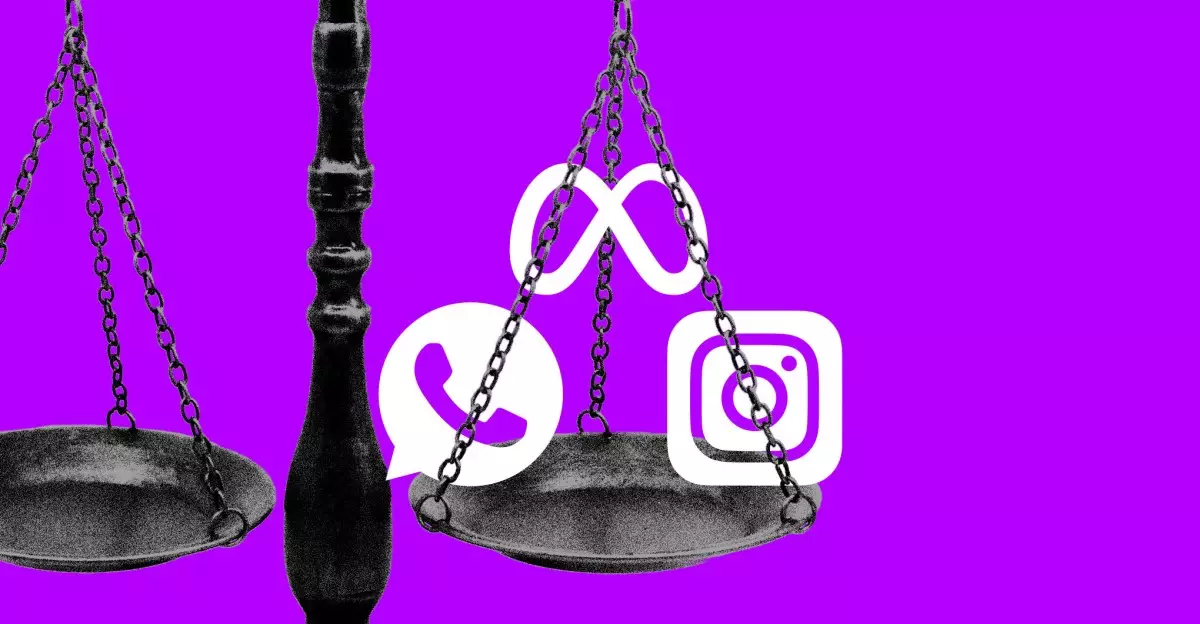In the rapidly evolving digital landscape, the meteoric rise of Meta, formerly known as Facebook, commands a significant place in the narrative of modern technology and its integration into our daily lives. CEO Mark Zuckerberg’s recent testimony during the FTC v. Meta trial illustrates the intricate web of strategic decisions that have propelled the company to dominate the social media sphere. With a slew of acquisitions—including WhatsApp and Instagram—Meta has not only redefined social connectivity but also raised eyebrows regarding its business practices and intentions.
During the trial that began on April 14, 2023, Zuckerberg faced rigorous questioning as federal authorities sought to substantiate their claims that these multi-billion dollar acquisitions were not merely strategic investments but rather calculated moves to eliminate competition in the market. As the trial unfolded, Zuckerberg’s confident assertions reflected a calculated defense mechanism aimed at dispelling allegations of anti-competitive conduct.
Zuckerberg’s Strategic Defense
In a courtroom winding with tension, Zuckerberg’s rebuttal to the claims against Meta presented a fascinating dichotomy. When asked whether he regretted investing $19 billion to acquire WhatsApp, he responded with a grin, indicating a level of self-assurance that seems to stem from his unwavering belief in the value of this acquisition. His defense hinged on the assertion that he viewed WhatsApp as a critical asset during a pivotal transformation in online communication—a shift moving from public forums, like Facebook’s News Feed, to private messaging.
This perspective suggests a nuanced understanding of user behavior that transcends market control. Zuckerberg emphasized that he recognized how messaging apps were evolving and how WhatsApp represented a significant leap towards privatized communication—an essential counterpoint for surviving against major players like Apple and Google, who often dictate terms through their platforms.
A Pivotal Shift in Communication
As Zuckerberg recounted his interactions with WhatsApp’s co-founders, his testimony revealed a personal layer to a strategic business decision. Despite concerns that WhatsApp could emerge as stronger competition, Zuckerberg dismissed this notion, claiming that he perceived the app’s co-founders as “unambitious.” This admission, while seemingly candid, raises questions about the ethics of Zuckerberg’s acquisition strategy.
Instead of a predatory mindset aimed at stifling competition, Zuckerberg painted a vision of collaborative evolution. He posited that he was willing to influence WhatsApp’s trajectory, gradually introducing social features that could enhance user interaction and diversify the app’s functionality. Within this narrative, Zuckerberg’s motivations appear to align more with enrichment rather than suppression—a portrayal that the FTC endeavored to dismantle.
Instagram: The Rival That Reinforced Meta’s Portfolio
Zuckerberg’s reflections on the acquisition of Instagram delve into a fascinating juxtaposition, particularly against the backdrop of imposed government scrutiny being a central element of the trial. Faced with the threat of Instagram usurping Facebook’s user base, he sought to integrate the two platforms more closely while claiming that he did not view Instagram as a direct threat until it had grown substantially.
This narrative holds weight, the concern over a competing platform becomes palpable only as user engagement escalates. Despite his claims of not fearing Instagram initially, it is evident that his strategic pivot to consolidate and delegate powers away from Instagram for cross-platform utilization served as a defensive maneuver—one that allegedly reinforced Meta’s powerful grip on social networking.
Internal Dynamics: An Evaluation of Meta’s Culture
Emerging from the courtroom was an intriguing glimpse into the internal culture of Meta. Zuckerberg provided testimony of key meetings, displaying essential dialogues within the executive team about the perceived value and direction of acquisitions. This internal discourse not only reflects on Zuckerberg’s leadership style but also brings light to the complexities of operational dynamics among the top echelons of Meta.
Remarkably, prominent figures like Sheryl Sandberg, who followed Zuckerberg’s testimony, provided an introspective lens on the financial assessments at play during the acquisition phases. Her admission of misjudging the value of Instagram, despite the hesitations expressed at initial costs, highlighted the unpredictability of market movements and user engagement—a humble recognition that even seasoned executives can miscalibrate their judgment.
As the FTC v. Meta trial progresses, it’s impossible to ignore the monumental implications of these acquisitions on the contemporary media landscape. Questions linger about whether social platforms like Meta should be beyond the reach of regulatory scrutiny, or if they must contend with the question of intent behind their marketplace ascension. The very foundation of these debates shapes the future of tech governance and consumer protectorate standards across the globe.

